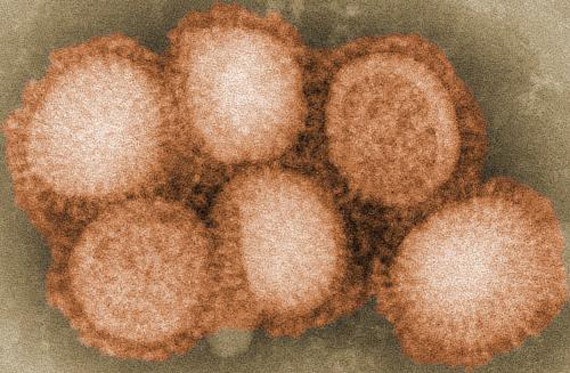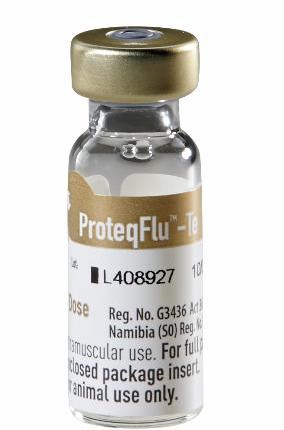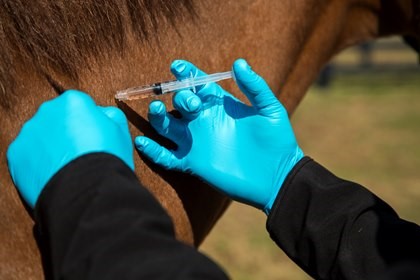Equine influenza (flu) is caused by the highly contagious influenza virus (H3N8). Although infection with the disease does not usually cause a long term or fatal illness, affected horses tend to become unwell and require time off work sometimes for prolonged periods of time. The disease is endemic in the UK horse population. It can lead to serious complications in very young or old horses and due to its infectious nature can spread rapidly through groups of unprotected (unvaccinated) horses. This can have serious economic consequences e.g. on a racing yard, livery yard or riding school.
Figure 1: The equine influenza virus as seen through an electron microscope.

What are the signs of equine influenza?
The clinical symptoms of equine influenza are very similar to those experienced by humans suffering from “the flu”. The clinical signs are caused by infection of the respiratory tract, and typically include a dry, hacking cough, nasal discharge and a fever. More severe signs such as pneumonia can occur in some individuals particularly foals. Influenza is an airborne virus and horses become infected through direct contact with an infected horse or through indirect contact via contaminated equipment or people.
How is equine influenza treated?
Unfortunately no specific treatment for equine influenza exists, and while antibiotics may be useful to control a secondary bacterial infection they will not treat the virus itself. Non-steroidal anti-inflammatory drugs (NSAIDs) such as Phenylbutazone (Bute) will help to reduce some of the symptoms experienced, and will make an affected horse feel more comfortable. Affected horses often require a minimum of six weeks rest to recover or longer in more severe cases and your vet will advise you on this. A rough “rule of thumb” sometimes quoted is that an affected horse should have one week off work for every day it has a high temperature.
Prevention of the disease is achieved through routine vaccination and good biosecurity management.
Influenza FAQs
Can horses die from Equine Influenza?
Yes, on rare occasions they can. However, the disease has a low mortality rate so it is unlikely that your horse would die from a flu infection. However, the virus can cause a form of pneumonia, which can prove fatal in foals or yearlings.
Are there any long term consequences following equine influenza infection?
The majority of horses will recover within about 14 days; however, in some horses a post-viral cough can persist for a much longer time, sometimes up to several weeks. On rare occasions it can take up to 6 months for some horses to regain full health. Horses can develop permanent lung damage following a bout of influenza, which will cause performance related issues. There is also the potential that horses can develop myositis (sore muscles) and myocarditis (heart muscle inflammation), which can subsequently cause an irregular heartbeat.
Can I exercise my horse as soon as the coughing has stopped?
Following a bout of flu it is important to give a horse complete rest for at least 6 weeks. A rough “rule of thumb” sometimes quoted is that an affected horse should have one week off work for every day it has a high temperature.
How far can influenza travel?
Influenza is an airborne virus and can spread quickly and easily through a yard. Under favourable weather conditions it can spread up to 5km.
What should I do if I suspect my horse may have influenza?
In the first instance, try to limit the spread of the disease by isolating your horse from others (this rule applies to all infectious respiratory diseases). The virus spreads rapidly, so if other in contact horses are coughing this may be too late. It is important to seek veterinary advice immediately. Your vet may take some samples, such as a nasopharyngeal swab, to help determine what infectious disease your horse is suffering from in order that appropriate advice on treatment and return to work can be given.
Do all horses show the same signs?
The severity of symptoms depends on a number of different factors such as age, stress, exercise level, vaccination status, and also on how virulent the infecting virus is. Naïve unvaccinated horses experiencing infection for the first time are likely to show marked clinical signs whereas other horses may only show mild signs.
Can I check that new horses entering my yard aren’t already infected with flu – is there a test, and what are the best quarantine measures I can take to protect all other horses?
It is advisable to isolate all new horses arriving on a yard for 2- 3 weeks. An isolation paddock (with stable) well away from the main yard will allow horses that are incubating a disease to develop symptoms whilst reducing the risk of the disease spreading to other horses on the yard. Laboratory tests are available to diagnose disease in horses displaying symptoms, such as a nasopharyngeal swab, which can be submitted to the laboratory for polymerase chain reaction (PCR) testing and / or virus isolation. Paired blood samples (paired serology) taken 14 days apart can also be helpful to monitor for rising antibody levels, which would indicate infection. In addition to the isolation facilities, your yard should also have a protocol of what to do in the event of a suspected case of infectious respiratory disease. By having these measures in place prior to any suspected disease outbreak you will be able to limit the impact of disease on your yard.
What can I do to prevent my horse from getting Flu?
Vaccinating regularly, and according to the manufacturers’ guidelines, is the best way to protect your horse against equine influenza. Vaccination can also protect the herd, whether this is your horse’s field companion or the other horses on your yard. Vaccinating a large proportion of the equine population (>85%) will limit the ability of the virus to spread, and thus reduce the incidence of outbreaks.
When should I vaccinate my horse?
A vaccination regimen consists of a primary course, which can be given from around 6 months of age. This consists of two injections 4-6 weeks apart (British Horse Racing Authority Rules state 21-92 days apart) followed by the first booster 5-7 months later (British Horse Racing Authority state 150-215 days apart). Thereafter booster vaccinations are given annually (must be done within the 365 day period). FEI regulations are slightly different and require a horse to have received the full primary course and a flu booster within the last 6 months + 21 days. Horses vaccinated against influenza are not allowed to compete within 7 days of receiving the vaccination. Tetanus can be combined within the influenza vaccination so dual protection is provided.
Figure 2: Vaccination is vital in protecting your horse against equine influenza.


I don’t compete my horse so do I need to vaccinate against equine influenza?
Yes, you should still vaccinate your horse against equine influenza, especially if your horse has contact with other horses. It is easy to overlook the importance of influenza as a disease, because outbreaks are relatively rare and the mortality rate of the disease is low. However, influenza is a debilitating disease, can be distressing for you to witness and can be costly to treat. Vaccinating your horse offers the best chance of protecting your horse against influenza.
Do I really need to keep on vaccinating against influenza each year?
Yes, vaccines will afford protection for 365 days following the initial three injections. After this period antibody levels decline and your horse will no longer have maximal protection against equine influenza. Depending on your equine sport’s governing body it may be their requirement that your horse’s vaccinations have to be up to date in order to compete. Failure to keep up to date with vaccinations means that the entire vaccine course would have to be re-started, which can be costly. Although Central Equine Vets does offer a complimentary vaccine reminder service by both text message and post card, ultimately it is the owner’s responsibility to remember when their horse’s vaccinations are due.
I’ve heard that there are different strains of Equine Flu, does that mean I need more than one vaccination?
Similar to human influenza, there are different strains of equine influenza circulating throughout the world, some more infectious than others. Again like the human influenza virus the virus can also mutate (antigenic drift) in an attempt to fool the body’s immune system. Different vaccines exist within the UK and contain different strains of the virus. The vaccinations do offer cross protection against the various strains of equine influenza. All the vaccines licensed for use in the UK undergo strict tests to ensure that they are safe and effective so that any licensed vaccine can be used to protect your horse. It is more important to check that your horse and as many as possible are vaccinated to encourage the concept of herd immunity.